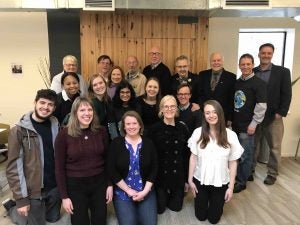The Environmental Justice HistoryLab is a research collaboration based in the Department of History at the University of Michigan and a centerpiece of its U-M HistoryLabs initiative to present scholarship to broader publics beyond academia through faculty-student collaborations, innovative digital platforms, and community partnerships. The agenda of the Environmental Justice HistoryLab advances the History Department’s vision of “History in the Public Service” and the University of Michigan’s “Engaged Michigan” commitment to “scholarship and service for society,” in particular through our commitment to excavating the histories of environmental activism, justice, and sustainability to inform policymakers and empower advocacy organizations.
The Environmental Justice HistoryLab originated in a Fall 2017 course on “Environmental Activism in Michigan” taught by Professor Matt Lassiter as part of the History Department’s “Michigan in the World” program to involve undergraduate students in collaborative archival research projects published on digital platforms. The eight students in that course created the digital exhibit “Give Earth a Chance: Environmental Activism in Michigan,” documenting the first Earth Day movement in 1970 and a number of local, state, and national environmental campaigns in the 1960s and early 1970s. This project led directly to a partnership with the Ecology Center of Ann Arbor that is at the center of the Environmental Justice HistoryLab’s mission, including research internships for Ecology Center History Fellows to document the history of environmental justice and sustainability campaigns in Michigan. In spring 2019, the newly formed Environmental Justice HistoryLab received funding from the U-M Center for Academic Innovation to expand its public engagement activities through additional undergraduate internships, an expanded collaboration with the Ecology Center, and a central role in the commemoration of the fiftieth anniversary of the 1970 Teach-In on the Environment at the University of Michigan and the broader Earth Day mobilization that soon followed. A related Environmental Justice HistoryLab initiative, led by Professor Perrin Selcer of the Department of History, is investigating sites of toxic pollution as part of the concurrent Great Lakes Theme Semester in Winter 2020.
The main initiatives of the Environmental Justice HistoryLab are linked below, with more information available through the headings on the top menu. Please check back often for additional projects and research publications as we expand our activities. Direct any inquiries or feedback to Matt Lassiter, the faculty coordinator of the Environmental Justice HistoryLab, at mlassite@umich.edu.
“Give Earth a Chance: Environmental Activism in Michigan”
Click below to learn more about the digital exhibit “Give Earth a Chance: Environmental Activism in Michigan,” the pilot project published in Jan. 2018 by the Environmental Justice HistoryLab. A team of eight undergraduate students digitized more than six hundred archival documents and conducted ten interviews with environmental activists to create this multimedia exhibit.
Ecology Center History Partnership
Click below to learn about the research conducted by undergraduate students in the Ecology Center History Fellowship program, and other members of the Environmental Justice HistoryLab, to document the history of environmental activism in the areas of sustainability and justice in Ann Arbor and the state of Michigan since the founding of the Ecology Center in the spring of 1970. Publications include an oral history archive and the digital exhibit: “The Ecology Center: 50 Years of Education and Activism for Environmental Health and Justice.”
50th Anniversary Commemoration of Earth Day 1970 and the ENACT Teach-In
Click below to watch the video recordings of two panel discussions organized by the Environmental Justice HistoryLab, in partnership with the Ecology Center and the School for Environment and Sustainability, on March 11, 2020. Six U-M alumni who were leaders in the original Earth Day movement returned for the panel “Environmental Action for Survival: The History and Legacies of U-M’s 1970 Teach-In on the Environment.” Two of these alumni then joined three current student organizers from U-M and Ann Arbor for “Youth Activism, Then and Now: Student Activists from Several Generations on Youth Activism and Environmental Justice.”
Documentary Film about the ENACT 1970 Teach-In on the Environment
Click below to watch The Environmental Action for Survival (ENACT) Teach-In of 1970, a student-produced documentary film released by the Environmental Justice HistoryLab in April 1970 to commemorate the 50th anniversary of Earth Day.
Documentary Film Sequel about ENACT Teach-In Legacies
Click below to watch Environmental Action for Survival: Celebrating the Organizers of the 1970 Teach-In on the Environment and 50 Years of Environmental Activism, a second documentary film based on interviews conducted with the organizers of the ENACT Teach-In of 1970 when they returned to Ann Arbor for the Earth Day commemoration in March 2020.
Below: Researchers from the Environmental Justice HistoryLab join the leaders of the Ecology Center and the veteran activists from ENACT/Earth Day 1970 at the Ecology Center’s headquarters before the March 11, 2020, commemorative panels.

Below: Professor Matt Lassiter, the founder of the Environmental Justice HistoryLab, after the “Environmental Action for Survival” panel discussion on March 11, 2020.

Graphic collage (top of page) created by Greg Parker, U-M History Department








